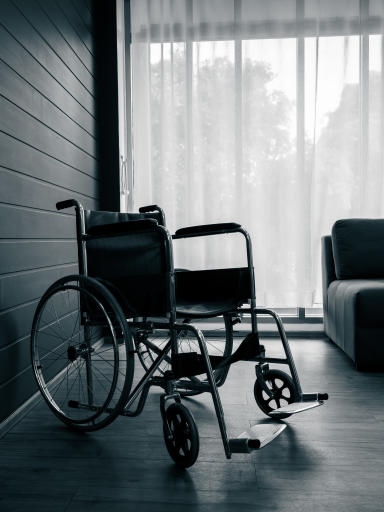How Much Does an Attorney for Nursing Home Abuse Cost? [2024]

In 2022, the World Health Organization reported that 1 in 6 older adults experienced some form of abuse. Since the pandemic, elder abuse has increased, with many facilities left without sufficient staff to care for their patients. With the increased number of cases, there are more resources to ensure you get the aid needed to pursue litigation. In the following paragraphs, we will explore the various types of abuse, how an attorney may assist your case, and break down the costs associated with litigation.
If you or a loved one is in danger, please review the resources at the bottom of the page to find tips and hotline numbers for each state to help folks understand their options and seek protection.
Do I Need a Nursing Home Abuse Attorney?
The experience of leaving behind your home to move into a care facility is hard enough. When older adults move into a nursing home, they trust that they will be well-cared for as they transition through the later stages of life. As mentioned above, elder abuse cases are on the rise, and perpetrators deserve to be held accountable. An attorney can significantly increase your chances of success as they have experience proving cases of abuse in court. This next section will detail the various forms of abuse and how an attorney may assist you as you fight for justice.
Types of Abuse
Abuse can occur in many forms, and not all are easy to detect. The list below describes the various forms of abuse that occur in nursing homes and warning signs that you can look out for to better detect elder abuse. The sooner a case can be reported, the better for the victim and other residents in the home.
Physical abuse is described as bodily harm and can look like a resident being hit, pushed, or kicked around. Further, physically restraining patients when not medically necessary or with force is another form of physical abuse. Evidence may be easier to spot as unexplained injuries appear, such as bruises or broken bones.
Emotional abuse is the most commonly observed in victims. This abuse looks like a caregiver forcing a patient to do things against their will or threatening them into submission. Insults and degradation are also common forms of emotional abuse. Emotional abuse can be more difficult to uncover because it leaves no physical marks. Pay close attention to sudden changes in mood, morale, or behavior.
Neglect has become more common following the pandemic due to insufficient staffing in care facilities. Negligence occurs when the caregiver fails to follow hygiene and nutrition guidelines for the resident. Victims have also filed complaints regarding caregivers failing to give medication or leaving the resident unattended when they require assistance. Warning signs include physical developments like bed sores, dried feces, urine-saturated clothing or bedding, malnutrition, or an unclean appearance.
Financial abuse is less common as there are strict guidelines regarding what a caregiver can receive financially from a resident. However, examples of financial abuse that are still seen include stealing money (cash or credit cards) or valuables, restricting a resident’s ability to access their bank accounts, stealing bank information, coercion, or intimidation into changing their will. Keep a record of all valuables, cash, and bank information secured and locked away. Look out for suspicious charges on your accounts or sudden changes to a will to detect financial abuse.
Why Hire an Attorney?
Case evidence has shown that an attorney can thoroughly aid your chances of success in a lawsuit. From an in-depth understanding of court proceedings and laws to the network of resources available, an attorney reduces the stress of litigation so that you can focus on your recovery. Attorneys translate your painful experience into monetary amounts and expertly demonstrate their validity. Their experience in court and legal counsel ensures you are well-informed at every turn and can keep up with dates, deadlines, and appearances. Attorneys work to protect the rights of their clients and will employ every available tool to prove your case and win compensation for your pain.
When deciding to hire an attorney, look at all of the facts of your case and attend a consultation (or a few) with an attorney to discuss the case's potential success. It is important to consider how much your case is worth financially to ensure you are not fighting for less money than it will take to sue. An attorney has the insight needed to help guide you on this decision, as they will let you know the potential risk involved in pursuing your lawsuit.
Nursing Home Abuse Attorney Costs: What To Expect
Attorneys have the potential to increase the success of your case. However, the prospect of hiring may feel daunting. If you have experienced abuse and have started your search for an attorney, know that options are available to you. Many law firms offer a free consultation where an attorney briefly reviews the details of the case and offers insight. This is also an opportunity for you (their potential client) to get a feel for the attorney’s working style, cost, and experience. It is important to have an idea of how much your lawsuit will cost in total to ensure you are making the right decision in pursuing damages. Below, we will break down some of the costs you can expect to see in a nursing home abuse lawsuit.
How Will I Pay?
Contingency Fees:
A contingency fee is the payment structure most often used in nursing home abuse cases. With this arrangement, you will pay your attorney a percentage of the money you receive if you win your case. If you do not win, the lawyer will not receive a fee. When discussing the contract, ask what percentage the lawyer will take from your profits and if their percentage is calculated before or after all other costs (such as medical bills and court fees) are deducted. Depending on your agreement, the attorney may front the money for additional court fees and collect those expenses from the settlement upon winning the case. Attorney fees can vary significantly based on the experience and availability of the individual, though the average is 33% of your net winnings.
Retainer:
When an attorney is hired on retainer, the attorney agrees to work on your case for a specific time or case period in exchange for a fee paid upfront by you called a retainer. All expenses and billable hours will be deducted from the retainer as they are incurred.
When Will I Pay?
How you will pay will depend on the type of payment agreed upon. Contingency agreements are paid upon completion of the lawsuit once damages have been received. Compensation for other expenses, such as filing fees or expert witnesses, may need to be paid as they occur unless otherwise arranged in your contract. When utilizing a retainer, you will be required to pay a deposit upfront for expenses incurred. Each time the attorney works on your case or pays a court expense, the amount will be deducted from the retainer.
Other Court Fees
Aside from attorney fees, other costs may be associated with your case that must be considered. Your attorney should clearly define what you will be responsible for, whether you win or lose your case. When talking with your attorney, ask them to estimate what fees you might incur and how much they might cost. These costs add up quickly, and you can expect to pay upwards of 15,000 to 20,000 for associated court fees. Some of those fees might be:
Court filing
Medical transcript copies
Police records
Expert witness
Process servers
Travel expenses
Ensure you understand which fees your attorney estimates and how they are paid based on your agreement.
Resources for Victims
If you or someone you love has been a victim of abuse, there are resources to help you seek justice. Whether you need help reporting your case, finding an attorney, or healing from your experiences, support is out there. Check out the links below to help you get started on the path to recovery.
Adult Protective Services (APS)
Adult Protective Services is a government-funded social service program that receives and investigates elder abuse claims. Their mission is to provide victims with a safe and confidential space to report what is happening to them. The link below will connect you to the national APS website, where you can select the state you live in, and the site will provide you with the local APS number to call and report your claim. If you do not have access to a phone and have a trusted medical professional or family member, you can ask them to report the abuser on your behalf. All calls are confidential.
National Adult Protective Services Association
Elder Protection Center
The Elder Protection Center provides information for aging individuals and their families to help prevent and protect them from becoming victims of elder abuse. For folks who already expect abuse to have occurred, they offer advice and resources to report the issue and help get the victim to a safe and stable situation. The link to their website is below. However, if you need assistance, the link here will take you to state-specific hotlines to report your concerns.
Expertise.com StaffAuthor
Step into the world of Expertise.com, your go-to hub for credible insights. We don't take accuracy lightly around here. Our squad of expert reviewers, each a maestro in their field, has given the green light to every single article you'll find. From rigorous fact-checking to meticulous evaluations of service providers, we've got it all covered. So feel free to dive in and explore. The information you'll uncover has been stamped with the seal of approval by our top-notch experts.




